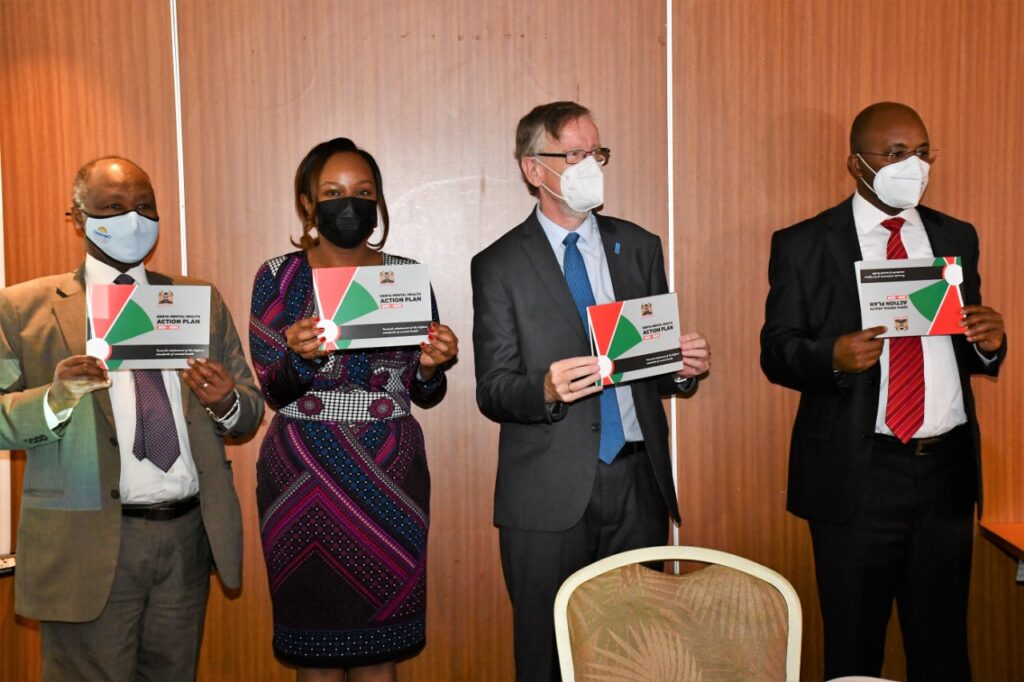The journey towards transforming mental health care systems in Kenya has gathered momentum following the launch of the Kenya Mental Health Action Plan (2021-2025). Ministry of Health Chief Administrative Secretary (CAS) Dr. Mercy Mwangangi who unveiled the 74-page document on behalf of Health Cabinet Secretary Senator Mutahi Kagwe, pointed out mental health remains an integral pillar in the country’s health system and social-economic development. She called for concerted efforts to boost mental health care systems through investment, dedication and planning for resources, coordination, oversight, awareness creation and advocacy.
“Public and private partnerships will be an essential ingredient in the successful implementation of this action plan. I call upon county governments, private sector, faith-based organizations, NGO’s and community groups to commit and invest in mental health to help actualize the objectives of this mental health plan,” she said.
The launch of the mental health action plan comes in the midst of the Covid 19 pandemic which has caused significant health, socio economic and psychological impact on people. In addition, the country has experienced a sharp increase in suicide cases, mental health conditions, substance use and addictive disorders which points to social challenges and unmet needs at societal level.
It is these challenges that the document seeks to remedy in line with the Kenya Mental Health Policy 2015 – 2030. It spells out a four-point broad plan to boost mental health structures as well as increase funding. According to Dr. Mwangangi, the document prioritizes strengthening of mental health leadership and governance, implementation of strategies for promotion of mental health and prevention of mental and substance use disorders, ensuring access to comprehensive, integrated and high-quality mental health services as well as strengthening mental health systems, including health information and research.
Additionally, Dr. Mwangangi pointed out the policy recognizes the need to promote mental health, adoption of preventive programmes focusing on families and communities at all cross-sectoral levels and reduce stigma. Some of the activities in the action plan include enhancing mental health literacy, addressing the determinants of mental health and reduction of risk factors. Other strategic actions are geared towards; reorganising, transforming and increasing coverage of services. This she says will be achieved by establishing affordable services closer to communities, ensuring comprehensive quality care and developing person centred services. “Through the plan, mental health and psychosocial support will be integrated in the emergency and humanitarian response especially in the response to the COVID-19 pandemic as well as a long-term recovery strategy.” Noted the CAS.
World Health Organisation Representative Dr. Rudi Eggers addressing the meeting said;“Many mental health diseases can effectively be treated at a relatively low cost. However, there remains a substantial gap between people needing care and accessing care which needs to be addressed,’’ adding that, “effective treatment of mental diseases remains relatively low in many countries including Kenya’’.
On the issue of allocation of resources, the Chief Administrative Secretary said the National and County Governments are expected to dedicate resources towards establishment of user-friendly mental health infrastructure and amenities. “This will include ICT based services at community and primary care level and ensure consistent supply of essential and high-quality medicine, equipment and technologies’’ she observed.
Speaking during the launch, Presidential Advisor on mental health Dr. Frank Njenga said the Government has already allocated 200 acres of land around Ngong area to have Mathari National Teaching and Referral hospital relocated from where it has been since 1911.
Dr. Mwangangi urged county governments, Faith Based Organisations, Non-Governmental organizations and community-based organizations to adopt and integrate the action plan in their programmes and activities.
The journey to transform mental healthcare systems began two years ago following a presidential directive during the 2019 Madaraka Day celebrations. President Uhuru Kenyatta ordered for the formulation of an appropriate policy response at the national and county level owing to an increase in cases of depression.
Key highlights of the mental health action plan
- Parliament to enact legislation for establishment of an independent mental health board or equivalent governance institution such as a mental health commission/authority,
- Establishment of County Mental Health councils and Mental Health Coordination Units,
- Review of the Mental Health Act 1989 to establish County Mental Health Councils,
- Establishment and operationalization of counselling and wellness units in all Government Ministries, State Departments and Agencies to address mental health and wellness.
- Mental health literacy through inclusion and training of mental health modules in schools and college curricula,
- Mental health promotive and preventive interventions through community, school and workplace programs,
- Implementation of the suicide prevention program,
- Integration of mental healthcare services at primary care and community level through cascading training of Community Health Volunteers (CHV) and primary care providers,
- Establishment of functional referral County Mental Health Units in all counties
- Strengthening of existing mental health units to offer substance use disorders treatment and rehabilitation services,
- Coverage of comprehensive mental health services under the UHC health benefit package,
- Establishment of a Mental health fund to address mental health disparities and establish community mental health programs,
- Revise training curriculum in medical colleges to include human rights and disability as it relates to mental health,
- Prioritize and increase scholarships for mental health professionals training at the County and National Government,
- Infrastructure development of community based mental health services with psychosocial support units,
- Restructure and improve Mathari hospital to a National specialized referral hospital and institute of mental health with affiliated six regional training and specialized services referral centres,
- Conduct a National Mental Health survey to establish the burden and resource gaps, and
- KEMSA to stock all psychotropic medicines in the Kenya Essential Medicine list (KEML)

